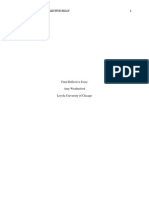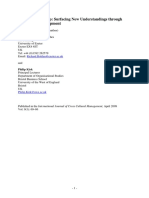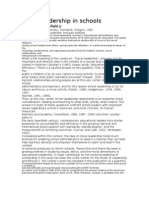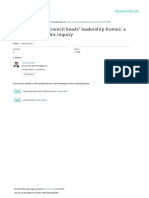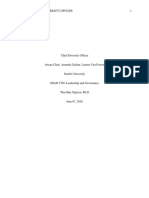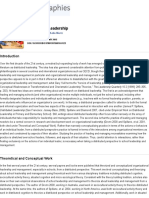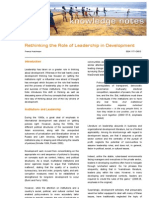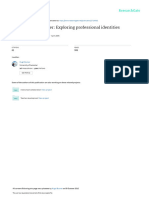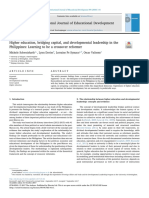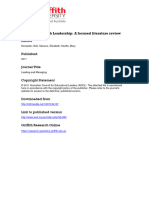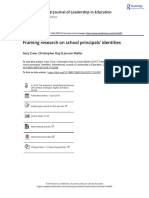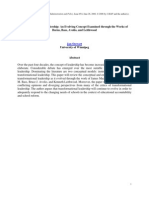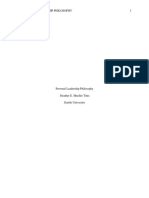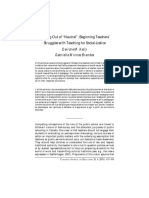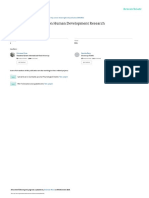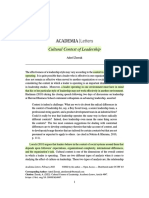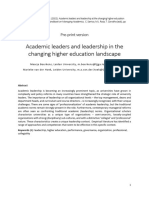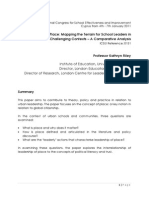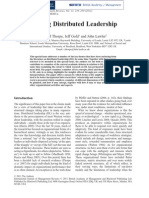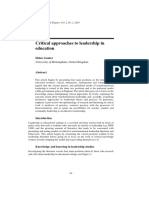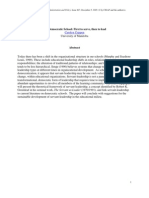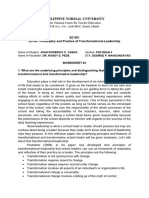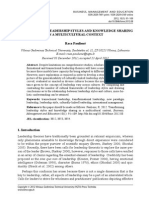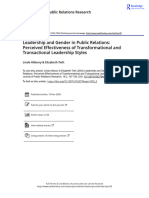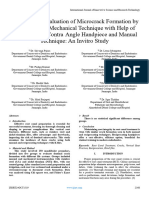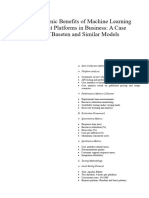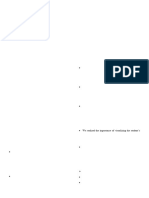Transformative Leadership: The Role of Private Schools' Managers in Promoting Social Justice
Transformative Leadership: The Role of Private Schools' Managers in Promoting Social Justice
Copyright:
Available Formats
Transformative Leadership: The Role of Private Schools' Managers in Promoting Social Justice
Transformative Leadership: The Role of Private Schools' Managers in Promoting Social Justice
Original Title
Copyright
Available Formats
Share this document
Did you find this document useful?
Is this content inappropriate?
Copyright:
Available Formats
Transformative Leadership: The Role of Private Schools' Managers in Promoting Social Justice
Transformative Leadership: The Role of Private Schools' Managers in Promoting Social Justice
Copyright:
Available Formats
Volume 9, Issue 7, July – 2024 International Journal of Innovative Science and Research Technology
ISSN No:-2456-2165 https://doi.org/10.38124/ijisrt/IJISRT24JUL1767
Transformative Leadership: The Role of Private
Schools’ Managers in Promoting Social Justice
Dr. Mabihi Shuping
Abstract:- Private schools are by definition independent awareness and advocacy. During the interview, I strategically
schools that are wholly supported by either private directed her to put more emphasis on her role in using the
organizations or individuals rather than by the state. There elements of social justice to uplift the marginalized groups as
is a commonly held view that seems to suggest that issues opposed to speaking about the roles she played on academic
of transformative leadership, social justice and Paolo interventions. Ethnographic observations also informed the
Freire’s (1970) dialogical tenets of love, humility, faith, development of this study. Ethnography suitably fits the aims
trust, solidarity and critical thinking often take a back seat of this study because it provides an understanding of the
at private international schools. Proponents of such view cultural and behavioural practices of particular groups in a
believe that private school’s principals are expected to particular context and time. For example, I have observed how
prioritize profit over social justice by leading and my transformative leader immersed herself fully into the
managing such schools like businesses. The aims of this Chinese culture at a research site (i.e. a secondary school in
paper are twofold: One, it is to provide evidence that Yinzhou district South Eastern part of China). Publicly
presents a contrasting view to that by uncovering a female available documents of the school and the pictures that portray
transformative leader from a private school in South the interviewee continuing to serve as a transformative leader
Eastern Asia who does not only espouse those Freirean at are used accordingly as per permission granted by the school.
tenets, but has been an agent of social change throughout The interviewee opted to relate her most memorable
her illustrious career as a leader and a doyenne of IB intervention as from the time when she was at a Fijian
(International Baccalaureate) curriculum. Two, to clear International School. The identity of that particular school was
the blurred lines that often exist between the role played concealed because of ethical consideration as permission was
by educational leaders as transformational, transactional not sought. The narrative visual and audio representation of
and transformative leaders in the private school space the case captures the gist of information garnered through the
(Shields, 2010). The paper seeks is to make privates schools’ interview as well as the ethnographic observations of the site
principals aware that they also have a role to play as agents where the transformative leader is now based.
of social change.
The major finding from the interview and the study
Keywords:- Private Schools, Transformative Leadership, refutes a popular view that leaders in private schools have
Transformational/Transactional Leadership, Dialogical propensities to prioritize profit and turn a blind eye to issues
Tenets, Social Justice. of transformative leadership. The findings are also significant
in illuminating Shields’ (2010) assertion that although
I. INTRODUCTION transformational/transactional and transformative leadership
theories have some common underpinnings, transformative
Narrative Case Study leadership involves principals attaining both the academic
To achieve the aims delineated above, emic one-to-one mandates and the social justice. In this case, private
semi- structured interview with a transformative leader to international schools.
understand how she has managed to balance her business-
oriented mandate of private schooling with social justice
IJISRT24JUL1767 www.ijisrt.com 3300
Volume 9, Issue 7, July – 2024 International Journal of Innovative Science and Research Technology
ISSN No:-2456-2165 https://doi.org/10.38124/ijisrt/IJISRT24JUL1767
II. LITERATURE REVIEW to promote a welcoming, inclusive and accepting climate for
minority Fijian teachers and students (Khalifa et.al 2016).
In affirmation of the stance that suggests that one has to
read more about literature that present an alternative/critical Literature on Frere’s (1970) dialogical tenets as
view on leadership so as to challenge the popular masculine or discussed in Miller, Brown and Hopson (2011) features
mainstream view, evidence-based literature will be prominently in this literature review. There are two reasons
meticulously selected from dedicated scholars about that informed the choice of this source. First, Freirean (1970)
educational leadership discourse on the following three related elements of love hope, faith, humility, critical thinking and
aspects: School education and social justice, Freirean solidarity are explicitly explained (Miller et.al 2011). The
dialogical tenets and the dichotomies between transformative other reason is that the context of urban leadership inferred in
and transformational or transactional leadership. More zest this scholarly source, fits perfectly with the idea of sampling a
on school education and social justice will hinge on Rawlsian principal that leads a private school in an urban area for an
(1958) work on distributive social justice. Academic literature interview.
that supports Rawlsian (1958) distributive social justices as
brought to light by dedicated scholars such as Nieuwenhuis Literature on Shields’ (2010) work wherein an in-depth
(2010) and Brighouse (2002) will be elicited. description of what the transformative leadership entails
provides a stark distinction between transformative and
Other academic writers with insightful contributory transformational/transactional leadership. This is
erudition on school education and social justice including but strategically done in order to sway the interview to lean more
not exhaustive to Keddie (2012), North (2006), Soto (2014), towards investigating the leader’s role on transformative
Jean-Marie, Normore and Brooks (2009), Giroux (1989) will leadership as opposed to neither transformational nor
be cited. Blackmore’s (2010) insights on intersectionality and transactional leadership. This forms the crux of what the
the disruption of common notions on leadership is of interview was intended to explore and one needed to be careful
paramount importance for this study considering that my not to side-track from that.
transformative leader is a foreign woman within a patriarchal
Chinese society. Some of those insights are adduced in Social Justice in Education
examples such as how throughout her career as a Social justice covers a wide range of aspects including,
transformative leader in East Asia and other parts of the world, but not exhaustive to elements such as equity, equality, equal
the interviewee (an Australian) was able to form de- opportunities, poverty and respect for diversity (Furman,
territorialized citizenships and advocated for collective 2012). Sherpa (2021) identifies three aspects of social justice,
national identities in the international schools in different namely; distributive, cultural and associational. For this study,
countries. It was also important for her as a female the expedience of Rawlsian notion of distributive social justice
transformative leader, to first recognize and acknowledge will be brought to light. Rawls (1958, p 163) avers that the
differences, so that she was be able to address inequities and “conception of social justice” is to be regarded as providing
inequalities. Intersectionality helps leaders to reflect on a “… in the first instance a standard whereby the distributive
myriad of intersecting identities and power structures. Khalifa, aspects of the basic structure of society are to be assessed.”
Gooden and Davis (2016) work on Culturally Responsive Rawls (1958, p173) further expounds that this standard should
School Leadership (CRSL) will also be drawn upon. This is form the basis for “assigning rights and duties and defining the
done primarily to unpack the interviewee’s comments about appropriate division of social advantage”.
the Fijian culture when she related ONE most memorable
intervention that she has implemented as a transformative Rawls (1958) also puts forward a convincing case that
leader in her illustrious career. From what I have garnered, I social justice provides a moral ground for modern democracy
was enthralled by how my transformative leader became to be fully expressed. It governs how people conduct
culturally responsive and supported the teachers in her efforts themselves in relation to others, particularly in educational set-
ups like schools. However, Nieuwenhuis (2010) raises a
IJISRT24JUL1767 www.ijisrt.com 3301
Volume 9, Issue 7, July – 2024 International Journal of Innovative Science and Research Technology
ISSN No:-2456-2165 https://doi.org/10.38124/ijisrt/IJISRT24JUL1767
contention that although authors like Rawls (1958) provides a participate in social activities that promote cultural
specific lens through which social justice in education can be representations of broader communities (Giroux, 1998).
viewed, they construct an ideal that can neither be legislated
nor achieved by enforcing international conventions and Freirean Dialogical Tenets
declarations. Nieuwenhuis (2010) further posits that social Miller et.al (2011) explore Freire’s (1970) critical
justice is rooted in peoples’ minds and hearts; therefore it has pedagogy to provide answers as to how educational leaders
to be lived. Soto (2014) is in concurrence with Niewenhuis can grapple with challenges in urban schools. In doing so, they
(2010) by asserting that projects that are made with hearty suggest an urban educational leadership style that is driven by
intentions, are likely to forge social justice ahead and obviate Freirean dialogical tenets of love, faith, humility, hope, critical
oppression. I concur with this view and argue that although thinking and solidarity. Miller et.al (2011) further point out to
the transformative leader I have sought happens to lead a Freire’s (1970, p.163) statement where he is quoted verbatim
private school, she has been an advocate of social justice even saying “the people must find themselves in the emerging
within that space because those values and principles of leaders, and the latter must find themselves in the people”. In
societal reform are rooted in her mind and heart. explaining this quotation, Miller et.al (2011) argue that Freire
illuminates his belief in the expediency of dialogue and
In affirming Rawl’s (1958) distributive notion of social leader’s solidarity with the people. Solidarity with the people,
justice, Brighouse (2002) suggests two principles that can according to Miller et.al (2011) makes leaders to refrain from
guide social justice in education, namely; fair equality of always giving instructions to the followers, but rather working
opportunity and equality of condition. Fair equality of towards cultural synthesis. Miller et.al (2011, p. 1086)
opportunity centers around equal treatment of people and describe each of the five Freirean (1970) dialogical tenets as
ensuring equal rights. Equality of condition gives follows:
marginalized equitable results by recognizing previous
atrocities and structural barriers embedded in the social, Humility: Open-mindedness fits the description of a leader
economic and political systems that perpetuate those systemic who embraces humility. Such leaders, do not have false
discriminations. In advancing the same reasoning asserted by dictums that they know it all or have solutions for all the
Rawls (1958), Brighouse (2002) postulates that personal challenges. Hence, they regularly seek for advices through
autonomy and educational equality is required in order to dialogue with their followers
achieve social justice in education. Personal autonomy means Faith: Leaders who have confidence and believe that their
that each child should have an opportunity to be autonomous followers will succeed or deliver are much more likely to
and be able to reflect on him/herself. Teachers in schools are succeed than those who lack confidence in their people
duty-bound to facilitate that autonomy. Hope: Leaders who are hopeful that there are opportunities
out there to be explored and attained by everyone often
Brighouse’s (2002) stance on autonomy resonates with reach their goals and objectives.
Frere’s (1970) argument that people need to develop critical Critical Thinking: Allow leaders to evaluate the decisions
conscientization and engage educative praxes that encapsulate they make with their teams and weigh how those decisions
theory, action and reflection as a means to attaining social impact on the results.
change and justice. Breuning (2016), further expounds that Solidarity: Leaders who work collaboratively for a
Frere’s (1970) reference to praxes that involve theory, action common course and towards the same goals with their
and reflection as activism implies that action cannot just be followers reap more benefits from those interconnections
considered to be a mundane activity, but a purposeful social than those who opt to work individually.
justice-cognate activity that is relevant to a changing society.
Teachers and educational leaders can implement change and Attributes of Transformative Leadership that Contrast it
lead social justice if they are provided with the autonomy to from Transformational/Transactional Leadership
develop as critical educational pedagogists. They can also Shields (2010) provides the differences between
succeed in doing that if they are given opportunities to transformative and transformational leaders in order to guide
IJISRT24JUL1767 www.ijisrt.com 3302
Volume 9, Issue 7, July – 2024 International Journal of Innovative Science and Research Technology
ISSN No:-2456-2165 https://doi.org/10.38124/ijisrt/IJISRT24JUL1767
educational leaders whose approach to leadership is broad in interview in order for her familiarize herself with the questions.
terms of including both the academics in a school and the Ethnographic observation of the respondent’s leadership style
social changes in communities. According to Shields (2010, and the critical analysis of the positive culture within school
p2), transformative leadership, in contrast with transactional were made. Gabrielian, Yang and Spice (2008) aver that
or transformative leadership takes int cognizance Freire (1989, observations entail the how one selects, watches and records
p37) posit “that education is not the ultimate lever for social information, behaviours and artefacts in the social setting
transformation, but without transformation it cannot occur”. chosen for the study. In this study the social setting is the
Shield (2010) further expounds that transformative leaders school – NBHIS and the information was recorded through the
criticize inequitable practices and offer promise of interview whilst also taking some time to observe the
achievement for individuals in conjunction with others. behaviours of the people in the school. The narrative style in
Transformative leadership calls for educational leaders to the video accompanying this narrative case study affirms the
work for equity in diverse contexts. Some other salient veracity of the points raised in the essay. The APA referencing
attributes that differentiate transformative leaders from style was used to acknowledge evidence-based literature cited
transactional and transformational leadership as averred by in both the essay and the concomitant video. Permission was
Shields (2010) are that transactional leadership is more sought to use both the name of the respondent and the school
bureaucratic as it operates on key values of honesty, where the study was conducted. A consent form and ethical
responsibility and honouring of commitments. clearance forms were signed prior the interview was
Transformational leadership puts more emphasis on school conducted.
effectiveness and reforms and improvements.
Validity and Reliability of the Ethnographic Observation
Research Processes and Procedures Study
According to Babbie and Mouton (2001, p.74), research According to Cohen, Manion and Morrison (2007),
processes and procedure involve a blueprint of how the study validity and reliability of observation-based research can be
will be conducted. These processes and procedures often link determined if answers to the following questions are provided:
the aims alluded to in the abstract with the purpose of the study, How can the results of one study be applicable to the other
method of data collection and resources available. Cohen and scenario that may be closely related to the first one?
Manion (1989) affirm that and rightly point out that there are How can genuineness of the results from the study be
three prerequisites to the design of the research, namely; tested?
purpose of the study, methods of collecting data and the
availability of the resources. Bias is always a challenge when an observation study is
done. The observer’s judgment may be clouded by their close
Purpose of the Study proximity or involvement to the study. This is likely to affect
To garner information as to what is ONE challenge that the genuineness of the results of such study. To address the
required the transformative leadership’s ideologies and questions delineated above, I will perform rigorous internal
intervention. It was to restore the dignity and respect of validity and reliability checks. For example, I will allow
teachers and students coming from low-socio economic class someone from outside to peer-review my observation and give
of the Fijian community. me feedback.
Methods of Collecting Data and Analysis Challenges Encountered
Emic face-to-face to semi- structured interview with the One major challenge was to stay alert to what I needed to
transformative leader was conducted to find out how she has investigate and avoid deviance. In the study like this where one
managed to effect the social changes in spite of the popular extracts answers from a respondent through the interviews,
view that private schools are only interested in profit and not there is always the danger of deviation from the aims of the
on matters of social justice. The list of possible questions for investigation, for example I had to make it clear from the on-
the interview were emailed to the respondent well before the set that the interview was about transformative leadership and
IJISRT24JUL1767 www.ijisrt.com 3303
Volume 9, Issue 7, July – 2024 International Journal of Innovative Science and Research Technology
ISSN No:-2456-2165 https://doi.org/10.38124/ijisrt/IJISRT24JUL1767
not transformational/transactional leadership. I also needed to headed the school’s Service Committee. In Switzerland, she
make it clear that we are looking for just ONE intervention she taught at the university and also did some community service.
implemented and not numerous interventions. It was an
onerous challenge to direct my transformative leader to focus In Japan 1994-96, she was College Counsellor and
more on her role for influencing programmes that are geared literature teacher and Language A also at Lincoln, in Argentina,
towards community upliftment and service as opposed to 1998-2001. Moving to Prem in Thailand was a change as she
ONLY school improvements during the interview. ran the girls boarding school and was CAS coordinator,
College Counsellor and language A teacher in the start-up
Another challenge was the hierarchical leadership school. From 2005-07 in Suva Fiji, she was the head of English,
conceptions of the Chinese culture. To be granted permission Creativity Action Service (CAS) coordinator and College
to conduct an interview with their employee and to do Counsellor. At the United World College of South East Asia
ethnographic observation in a private school, I had to knock (UWCSEA) from 2007-2015 she was a CAS advisor and
on many doors and attend many meetings with the board of Language A teacher. Her leadership began outside of school in
directors to present my case. I used the heuristic questions in 2004 working with the International Baccalaureate
my abstract to explain to the board about what the study would Organization (IBO) as examiner. In 2010 I trained as a
entail, why I was doing the study, how I intend to conduct the workshop leader and in 2013, she became a consultant, and
study, what is the hypothesis that would inform and what is the evaluator and an authorizer of new schools. Travelling over
significance of those findings. The last challenge was to access Asia in this capacity she learned about styles of leadership in
archived information of the school because it is in the Chinese international schools of all kinds. In 2015, she became an IB
culture to be stealth with private information. I resorted to lead educator training others to evaluate schools and to be
using publicly available online documents, photos and logos consultants. It is this platform which prompted NBHIS to offer
to garner useful information about the school’s background her the role of principal. She then moved to Ningbo Huamao
after the board gave me permission. International School BHIS in 2015 where is currently the
principal. She exudes with passion as she relates how she
Availability of Resources chose to accept the roles as leader a because she wanted to
Photographs and live video coverage of the school grow the groups of which she was in charge. She saw chances
context/premises and the logos/emblems as well as year books to do good and to streamline or improve those groups. she
were portrayed in the narrative video. The permission was duly developed an inclusive leadership style because she was a
granted for those resources to be used on conditions that the teacher in a school system for so long and saw what could be
ethical considerations were adhered to. One ethical done under many different heads. She says that but it was
consideration to adduce was that I had to present my findings really her IB training in consultation and collaboration which
to the board prior I submitted this work for peer review. determined her belief in allowing her co-workers to have
agency and in encouraging them to consult with their staff to
Biographical Details of the Transformative Leader get the best results for positive growth.
The female leader with rare qualities of balancing the
promotion of academic excellence with community service Background Information of the School
thus serving as an agent of social justice was identified. She Ningbo Huamao International School (NBHIS) is the
holds a master's degree in curriculum studies from Michigan first and only IB school in Ningbo city, Yinzhou district,
State University. In international schools Cheryl Keegan’s Zhejiang province South Eastern coastline of China. The
journey began in 1983 in Port Moresby International School, school started in 2006 as Huamao Foreign Language School.
in Papua New Guinea, where she taught literature and became The majority of students in NBHIS are mainly Chinese and the
head of one of the four houses of the school population. Her teaching staff from many countries globally. NBHIS offers
interest has always been service and so in Hong Kong three IB programmes namely; Primary Years Programme
International School from 1986-90 she taught literature and (PYP), Middle Years Programme (MYP) and Diploma
Programme (DP). The school is also the member of World
IJISRT24JUL1767 www.ijisrt.com 3304
Volume 9, Issue 7, July – 2024 International Journal of Innovative Science and Research Technology
ISSN No:-2456-2165 https://doi.org/10.38124/ijisrt/IJISRT24JUL1767
Association of Schools and Colleges and Round square. The [3]. Blackmore, J. (2010). Disrupting notions of leadership
school is governed as a joint venture by Huamao Educational from feminist post-colonial positions. International
Group. The principal acts as a Chief Executive Officer (CEO) Journal of Leadership in Education. (13)1. pp. 1-6.
and reports to the chairman of the board of directors. English [4]. Brighouse, H. (2002). Egalitarian liberalism and
is the predominant language of instruction and Chinese Justice in Education. Political Quarterly. 73(2). pp.
language and culture are well preserved in NBHIS. 181-190.
[5]. Cohen, L., Manion., L. & Morrison (2007). Research
Narrative Sketch methods in Education. Routledge. New York.
One key intervention that the transformative leader spoke [6]. Furman, G. (2012). Social justice leadership as praxis:
passionately about in the video was at the Fijian international Developing capacities through preparation programs.
school. The evidence provided was based on the recollection Educational Administration Quarterly. 48(2). pp. 191-
of the interviewee there. I did not have access to videos and 229.
images to support what she has done there because she has [7]. Gabrielian, V., Yang,K. & Spice, S. (2008).
since moved. Transformative change she implemented there is Quantitative research methods, in G.J Miller & K. Yan.
not wholly different from the great community activities she is Auerbach Publications, Taylor & Francis Group.
currently leading now in Ningbo. The images and videos [8]. Jean-Marie, G., Normore, A.H. & Brooks, J.S. (2009).
portrayed in the narrative video illustrate similar interventions Leadership for Social Justice: Preparing 21st Century
that she continues to lead in her endeavours to change the face School leaders for a New Social Order. Journal of
of private international school from the institutions that are Research on Leadership Education. (4)1. pp. 1-31.
deemed by society as only focused on profiteering to the ones [9]. Keddie, A. (2012). Schooling and social justice through
that promote/address social justice. the lenses of Nancy Fraser. Critical Studies in
Education. 53.3. pp.263-279.
III. CONCLUSION [10]. Khalifa, M., Gooden, M.A., & Davis, J.E. (2016).
Culturally Responsive School Leadership: A Synthesis
This paper has been successful in uncovering the talents of the Literature. Review of Educational Research.
and expertise of a female transformative leader by means of an (86)4. pp 1272-13111.
interview and ethnographic observations. Despite the [11]. Miller, M., Brown, T., & Hopson, R. (2011). Centering
challenges of patriarchy and the demands of promoting Love, Hope, and Trust in the Community:
academical excellence in a highly competitive and market- Transformative Urban Leadership Informed by Paolo
oriented private schooling sector, she still finds ways to Freire. Urban Education. 46.5 pp. 1078-1099.
balance her job to lead and inspire greatness with advocacy for [12]. Nieuwenhuis, J. (2010). Social justice in education
social justice. I consider her to be a paragon of a paradigm shift today. Acta Academia. 43(1). pp. 190-209
that is needed for all other educational institutions, including [13]. North, C.E. (2006). More than Words? Delving into the
international private schools to start prioritizing social justice Substantive Meaning(s) of “Social Justice” in
over profit. Education. Review of Educational Research. 76.4. pp.
507-535.
REFERENCES [14]. Rawls, J. (1958). Justice as fairness. Philosophical
Review. 62(2). pp. 163-193.
[1]. Babbie, E. & Mouton, J. The practice of social research. [15]. Sherpa, D. (2021) Practices of Social Justice in the
Oxford: Oxford University Press. Experiences of Private School Teachers.
[2]. Breuning, M.C. (2016). Critical and Social Justice Interdisciplinary Research in Education. 2(6). pp. 53-
Pedagogies in Practice. In M.A. Peters (Eds). 62. DOI: https://doi.org/10.3126/ire.v6i2.43538.
Encyclopaedia of Educational Philosophy and Theory,
DOI 10.1007/978-981-287-532-7_234-1.pp.1-6.
IJISRT24JUL1767 www.ijisrt.com 3305
Volume 9, Issue 7, July – 2024 International Journal of Innovative Science and Research Technology
ISSN No:-2456-2165 https://doi.org/10.38124/ijisrt/IJISRT24JUL1767
[16]. Shields, C. (2010). Transformative Leadership:
Working for Equity in Diverse Contexts. Educational
Administration Quarterly. 46(4). pp: 558-589.
[17]. Soto, L.D. (2014). Project from the heart: For
educational leaders. In International Handbook of
educational leadership and social (In)Justice. (pp. 309-
320). Dordrecht: Springer.
IJISRT24JUL1767 www.ijisrt.com 3306
Volume 9, Issue 7, July – 2024 International Journal of Innovative Science and Research Technology
ISSN No:-2456-2165 https://doi.org/10.38124/ijisrt/IJISRT24JUL1767
APPENDIX A
Transcript of the Interview
The Interviewer’s Name is Abbreviated SC and the Interviewee’s Name CK.
SC: I really appreciate the time you took out of your busy schedule to do this interview on transformative leadership. I am glad
that you are giving me this opportunity. Having spent some time being under your leadership here at this institution (Ningbo
Huamao International School), I have observed and admired how you have been able to not only inspire, but to foster a
multicultural group of teaching and non-teaching staff as well as students to have freedoms to reflect on their communities and
become agents of change. This perfectly fits the description of a transformative leaders and I have identified you as one.
CK: My pleasure
CK: So, would you like me to Work through your Questions?
SC: No, before you do that. Let me first give you some guidelines. Our interview basically centres around Paulo Frere’s
dialogical tenets that I will explain in more finer details as the interview continues, but throughout the interview, I would also
like to know more about how you utilize your transformative leadership skills to juggle between your academic improvement
mandate here at a private school with what is happening in the larger Ningbo community. More about social interventions. So,
in a nutshell we will also touch base on your insights about social justice.
SC: Now, who is Cheryl Keegan and can you tell me more about yourself?
CK: Yes, I am. I am a person who has worked in education for quite a long time in many different international schools, starting
in 1983, in Port Moresby, in Papua New Guinea. I began my work as a literature teacher and in 1986 to 90 was in Hong Kong
International School, again as a literature teacher. But also, then I ran a very large service committee for the whole school. I've
always been interested in service and how it can fit into school, so I was really pleased with that job. I was I was also looking in
service committee in Switzerland at the UN school, the International School of Geneva. But I also taught at a university, the
American University in Switzerland up in Lausanne. I wanted to try university as well as high school, so I did both there. Later,
1994 to 96, I was in Japan again teaching literature. College counselling and counselling generally in Argentina 1998 to 2001. I
was back to literature. That was just a brief one. And then really, I suppose my term in leadership began in Thailand. In Thailand
we started a new school, which is now a very big school in in Chiang Mai. I began because we all started with very small
numbers. We were all doing lots of jobs. So, I was CAS co-ordinator, college counsellor, I ran a girl boarding school, I was
teaching literature.
SC: Awesome! You were pretty destined to be a transformative leader, right?
CK: It was pretty busy running school activities, all sorts of things. In 2005 to 2007, we went to Fiji. My husband was head of
school and I was head of English and class coordinator and college counsellor there. And finally, he moved to work for the IB.
We moved to Singapore at 2007 to 2015 and I went to United World College and was cast there as well as literature. But in the
meantime, from 2004 I began working for the RBA. I was an examiner for many years and a workshop leader for teachers,
teaching teachers. Then eventually I became a consultant for new schools and I was allowed to evaluate schools and authorise
schools all over the Asia Pacific. That's really how I moved into this job when the school approached me for this job. I said, Well,
my credentials for being a head of school are really the job training and practice. So, after I came here, I became a lead educator
IJISRT24JUL1767 www.ijisrt.com 3307
Volume 9, Issue 7, July – 2024 International Journal of Innovative Science and Research Technology
ISSN No:-2456-2165 https://doi.org/10.38124/ijisrt/IJISRT24JUL1767
for the RBA, which means training, trainings and just monitoring evaluation reports and authorization reports, helping the IB to
make sure that when they introduce a new school or when they evaluate a present school, that it's done well.
SC: Wow! RBA? I reckon it is the Reserve Bank of Australia, the bank in your native country – Australia, I know that the
bank is actively involved in the development of public education, right? Your husband Mr. Stephen Keagan. What role did he
play in shaping the kind of transformative leader that you are?
CK: I think probably because he’s a mathematician and I am involved in literature English. So, when we were teaching in high
school together, we were always, you know, in those important departments. And so, we. Compared our practice. I think when
things changed, when he became head of school in Fiji and you know, he took on more leadership roles, he did a masters in
leadership before then. But I think the biggest change was when he was the Asia Pacific manager for the EIB. So, he had 360
schools at that time that he was looking after. He visited all of them in the first four years. And I watched as he spoke about the
difference in the schools and how their interpretation of the IB happened and what he saw as very valuable and so on. I think
that did form some of my opinions, but also, I think my master's in curriculum and teaching from Michigan State, which is a
very good university for education, we picked that one because that was that was so I think I think after this study also bonded
our ideas, we're definitely in the line of me. Both of us completely believe in the autonomy of the school to learn, to grow and
to reflect and to respond to requirements. And for teachers to.
SC: What is Cheryl Keegan's leadership style?
CK: I believe that leaders are just facilitators, so leaders are there in order to help the teachers. That's how it should work. You
know, leaders, leaders can organize and can direct in some cases, but really what they're there for is to make sure the systems in
the school work so that the teachers are supported and the students are supported and the families are supported and the school
feels safe. You know, the systems are there so that people do things the same way year on year, so that there's a culture building.
SC: Hold on, what do you mean by systems, do you imply maintaining the status quo? Elaborate please…
CK: I don't mean by that that nothing changes. But you have to have systems, standard operating procedures, we call them, you
have to have those in place before there's organization. Otherwise it's just chaos because it's this that everything changes. So, I
think what I like to do is put systems in, but I also like to have those systems reviewed by the teachers and the coordinators to
see they're relevant. And if we need to change, then we refine them. So, if systems are relevant, people will use them. If they're
useful, people will use them. So that’s probably the kind of leader I am. I believe in teachers’ autonomy. I believe I can make
decisions. I can. I believe they're the best ones to make decisions, but within a framework, not just according to their personal
preference
SC: Terrific! You are that kind of a leader, aren’t you?
CK: So, that is the kind of leader I am. I believe that the core business of the school happens in the classroom, not in this office.
You know, this office is there to protect and to support, but really the work of the school is in the classroom.
SC: How do you build mutual relationships between this school and the Ningbo community?
CK: We're a private school. And that means people choose to come. And that means at some level for us, we're a choice. If they
opt for us, then the Chinese principal and myself agree that we need to make sure that they're supportive, that they appreciate
the school, that they understand what we're doing, and that they support the school at home. Because for students, if they come
IJISRT24JUL1767 www.ijisrt.com 3308
Volume 9, Issue 7, July – 2024 International Journal of Innovative Science and Research Technology
ISSN No:-2456-2165 https://doi.org/10.38124/ijisrt/IJISRT24JUL1767
to school and teachers saying one thing and they're hearing something else at home, they get confused and they don't feel safe.
So that's the most important thing. How do you get community support? You make sure that people are talking to the families.
So, the homeroom teachers particularly and the other teachers need to communicate all the time with the with the community as
much as they can. Before COVID, we had lots of occasions in the year when we bring in the community, we ran huge carnivals
where they came for open days for parent teacher conferences. They came for special weeks. You know, we had information
sessions. Since COVID, most of that has been removed. And so, we haven't seen as much of our families as we would like.
Similarly, before COVID in the primary school, the parents could drop the children off right to the classroom, say hi to the
teacher and go. Now, I don't think we'll ever have that again. I think that's changed. But if we don't have it, we have to find other
ways to talk to them. The last way we should link with the community is service. We should be able to look around and see
what's needed. It's difficult in Asia because in Asia typically people don't like to say they need anything because it looks like
they're failing. But if you get the right connections, you can still go out and do some good work. You know, as we have mainly
before COVID, I'm afraid, but it will come again.
SC: Thank you. Can you describe for me the role of love, humility, faith, hope, critical thinking and solidarity in contributing
towards successful transformative leadership?
CK: Humility is necessary everywhere. If you don't have humility, you never listen to people, and it's hard to care about them.
A leader is at the top of a pyramid, but everyone standing on someone else's shoulders. So even the lowest people on the rung,
maybe the staff, you know, the office staff, etc., then the teachers rely on them and then the coordinators rely on the teachers and
then the principals rely on everybody. So, without that group, nothing can happen. So, you have to understand that and be humble
and realize that your position depends on so many other people. Yes, you depend on yourself, but really that's a small part of it.
It's a group mentality.
CK: And faith?
SC: Sure!
CK: Talking about faith, a faith, non-religious faith. But just faith is something that makes a leader. If people have faith in their
leaders, it means they trust them. If the leaders have faith in their staff, it means they trust them. And the second one is most
important, because if you don't believe people are good and are doing a good job.
SC: Elaborate more on hope, please
CK: Hope is stronger in the sense that hope means real belief in improvement and real belief that things will get better in bad
times. And so, it's challenged all the time. When difficult times come, hope is challenged. And so, the leaders are the ones that
need to say to people, we can fix this or improve this, or let's look for solutions. You can't just say, Oh, this is terrible, you know,
because then without hope, other people will say, oh! my God, leaders think it's terrible. It must be terrible. So, hope is something
that's catching you. It's it goes along with faith, but it's a little bit different. It's maybe more tangible. You know, in a in a classroom
situation, hope is the belief of the kids when they sit down to do an assignment that they can do it. They know what the teacher
is going to be grading on. They know the criteria. They understand it's a safe place and they try their best. You know, that's that
is tangible hope. Same with leaders. We have to hope that in all of our K-12 schools at this very moment, that there are teachers
in classrooms doing their job. There are communicators. There are coordinators looking, monitoring, helping. We have to hope
that that's our normal thing. And you build it, you know, if you don't have it, I think you have you're cynical and I think you
think it's just for money and it doesn't work.
IJISRT24JUL1767 www.ijisrt.com 3309
Volume 9, Issue 7, July – 2024 International Journal of Innovative Science and Research Technology
ISSN No:-2456-2165 https://doi.org/10.38124/ijisrt/IJISRT24JUL1767
SC: But on that score, there would be other views that say that kind of a laissez faire kind of leadership style where you just let
things be.
CK: It doesn't mean that it means those systems I talked about are in place and that through professional development, you
support teacher’s growth so that they understand more about their job. But that means they take more responsibility and that
builds hope. You know, so it's not laissez faire
SC: Critical Thinking?
CK: critical thinking for a leader. You have to accept different viewpoints. You have to be open. Different interpretations. And
then you have to think about them and sort them and be aware of them and how they fit into the whole pattern. And it goes right
down through the school. If everything is on surface level and it's black or white, right or wrong, it will remain on surface level.
Most of the job of the leader is not black and white. It's somewhere in the grey area. And you're constantly listening, listening
and deciding on a form of action. But more and more than that, you're listening, listening. And you're asking your coordinators
and your staff what they think because they're close enough to action to do it. But you have to take the ultimate responsibility.
So, it's complex.
SC: Oh yes, you cannot finish this interview by not talking about COVID-19 and its negative impact on education. Especially
with regards to teachers. I just finished reading an article written by one of my lecturers which talks about teachers being
transformative intellectuals, and I know that you are attracting teachers from all over the world and you are recruiting teachers
from all over the world. And I know that last time I was speaking to one teacher and she was saying to me, Oh, you know, the
way Ms. Cheryl is so convincing when she conducts those interviews, you really find yourself taking up your bags and coming
and come to hire. So how do you take care of your teachers? Emotional and psychological effect in the midst of this COVID
pandemic?
CK: It's really hard to do in our context in China. Particularly, I think in a way. I mean, in other countries there was more death
and there was more chaos about it, and that is its own problem. We didn't have so much of that and Ningbo particularly has been
not badly hit. But for us, the length of the restrictions, we haven't had long lockdowns, but the brief lockdowns, but the restriction
on travel and movement around our city, outside our city, outside the country, that's been really hard on foreigners and Chinese
alike, because a lot of our teachers are not from Ningbo. And so, they can't, they haven't been able to visit family in the rest of
China or have family come visit them. Same for foreigners. So, that's a distress for people because they want to have that touch
with family and loved ones. We try our best to make sure that people are busy, make sure that we offer some different things to
distract people. We've offered, you know, some sports and some relaxation and things, a lot of which we haven't been able to
make happen because of restrictions of numbers and so on. Partly then what I've done is through the coordinators, we've reminded
them about how people are feeling and encouraged them to talk to the staff about it and encourage them to say to let people talk
about how they're feeling and to introduce where they can some breaks, a little bit of fun, a little bit of activity that that reminds
people, oh, there's a world out there. You know, it's not a huge plan. But absolutely that the other thing I've done is talk to staff
about how the kids are feeling. You know, they need to put themselves in their kids’ perspective and that helps them understand
behaviour and to watch for warning signs because one of the ways you take care of staff is you give them a job and if their job
is to help keep their students mentally healthy, it helps them indirectly. So, you know, again, not a perfect plan, but as good as
we can do, I think.
SC: Hmm, I think that is a mouthful.
IJISRT24JUL1767 www.ijisrt.com 3310
Volume 9, Issue 7, July – 2024 International Journal of Innovative Science and Research Technology
ISSN No:-2456-2165 https://doi.org/10.38124/ijisrt/IJISRT24JUL1767
SC: As a principal and a transformative leader, what are the values and beliefs you refer to when leading your staff? And how
do you deal with divergent/contrasting views?
CK: That’s one thing. And to go over what I said before, you need to believe in yourself. You need to give them clear guidelines
that they can feel safe in. But then as they begin to grow, you need to let them grow and listen to them and let them try out their
ideas and then reflect with them about it. And in that way, they will believe that it's safe to have ideas and to and to put things
into practice, because sometimes in all kinds of schools, people go in with the idea. Or if I say too much, maybe I'll get into
trouble. Or maybe they'll think that I'm criticizing or whatever. But it's not true, you know. So, I would say I would say all the
questions that you've asked are the ones that transformative leaders need to think about and to practice.
SC: Great! Thank you so much.
IJISRT24JUL1767 www.ijisrt.com 3311
Volume 9, Issue 7, July – 2024 International Journal of Innovative Science and Research Technology
ISSN No:-2456-2165 https://doi.org/10.38124/ijisrt/IJISRT24JUL1767
APPENDIX B
Narrative Video’s Script
(Brief Background of the Respondent)
Interviewer/Narrator: This narrative video on transformative leadership mainly revolves around literature that presents an
alternative view from popular masculine or mainstream view on leadership to that of a critical view. Evidence based literature is
meticulously selected from dedicated scholars about educational leadership discourse. My identified transformative leader, C.K., is
not only a doyenne of IB curriculum, she's a woman with rare qualities and talents of having been able to balance her employers’
high expectations of the promotion of academic excellence with service to the community, thus deserving a title to be called an
Agent of Social Justice. She holds a master's degree in curriculum studies from Michigan State University. In international schools.
C.k’s. journey began in 1983 in Port Moresby International School. In Papua New Guinea, where she taught literature and became
head of one of the four houses of the school population. Her interest has always been that of service and so in Hong Kong
International School, from 1986 to 1990, she taught literature and headed the school's community service committee. In Switzerland,
she taught at the university and also did some community service work. From the year 2005 to 2007 in Suva, Fiji, she was the head
of English as well as Creativity Action Service (CAS) Coordinator and college counselor. And that's where she began her service to
the community. As you shall hear later when she speaks more passionately about the intervention that she did in that part of the
world. Traveling over Asia, in this capacity, she learned about styles of leadership in international schools of all kinds. In the year
2015, she became an IB educators’ training officer, training others to evaluate schools and to be consulted. It is in this platform
where she cut her teeth as a leader that prompted the present employer NBHIS to offer her the role of principal. She then moved to
NBHIS in 2015, where she still serving as a principal. She exudes with passion as she relates how she accepted the offer because
she wanted to change the face of private international schools from that of focusing only on profit making to that of promoting social
justice.
(Musical interlude as the slides flash for the viewers to read the literature review)
Interviewer/Narrator Good afternoon, Ms. Cheryl. I really appreciate the time that you took out of your busy schedule to do
this interview. I have identified you as a transformative leader. Let me first give you some guidelines as to how the interview is
going to unfold. Our interview is basically centering around Freirean dialogical tenets that I will explain in more finer details as the
interview unfolds. And I would also like to know more about how you utilize your transformative leadership skills to juggle between
your academic improvement mandate here at the private school with what is happening in the community, more about social
interventions. So, in a nutshell, we will touch base on your insights about social justice. So, tell me, what are the attributes of a
transformative leader?
Interviewee/Respondent: A leader must like and trust their staff. If they don't, they can't go anywhere. Right. So, you genuinely
have to believe that people are good. And then if they prove themselves disappointing, that's another thing. But. But you need to
start there.
Interviewer/Narrator: What are your views on the discourse that says schools need to address and promote the interests of those
that have been marginalized, for example, by race, socio-economic statuses, sexual orientation and women in particular?
Interviewee/Respondent: In education, women are pretty equal. I mean, all my life I've been paid equally and treated equally.
So, to be honest, I never think about male/female. I just think about the best person for the job if it needed a balance, right? If there
were a bunch of men in one position and I could employ a woman or a man, and they were the same level, then I would employ the
woman because it's balance. But same with the man.
IJISRT24JUL1767 www.ijisrt.com 3312
Volume 9, Issue 7, July – 2024 International Journal of Innovative Science and Research Technology
ISSN No:-2456-2165 https://doi.org/10.38124/ijisrt/IJISRT24JUL1767
Interviewer/Narrator: What is ONE key intervention that you have implemented as a transformative leader?
Interviewee/Respondent: I think it would be at this school in Fiji. At this school in Fiji, I went in as head of English and. As a
college counselor. It was a little international school and a lot of local kids, you know, government employees’ and ambassadors’,
kids and so on. When I went in, the previous head of school had really not valued the Fijian teachers. Students and teachers. So, the
Fijian teachers felt that they were second class citizens but in fact they weren't. This is not respectful. You know, and you start with
respect and. On this respect that it's shameful for them, you know, so another thing was we because we did a lot of work out in the
community where it's a poor community, we had to make sure that the Fijian kids said to the foreign kids, when you go into this
community, this is what you can do, this is what you can do, this is who you talk to, this is who we are. and so, when we left there,
with the feeling that we respected the people who were there and we lifted them up, you know, and it was a small thing, like little
bits here and there. But I think it gave me the best feeling. I felt I was so proud.
Interviewer/Narrator: What is the role of love, humility, faith, hope, critical thinking and solidarity in contributing towards
successful, transformative leadership?
Interviewee/Respondent: Humility is necessary everywhere. If you don't have humility, you never listen to people, and it's hard
to care about them. A leader is at the top of a pyramid, but everyone's standing on someone else's shoulders. So. So you have to
understand that and be humble and realize that your position depends on so many other people. Yes, you depend on yourself, but
really that's a small part of it. It's a group mentality.
Interviewer/Narrator: And what about that critical thinking?
Interviewer/Narrator: And faith, trust and solidarity?
Interviewee/Respondent: You're talking about faith, non-religious faith, which is faith, is something that makes a leader. If
people have faith in their leaders, it means they trust them. If the leaders have faith in their staff, it means they trust them. And the
second one is most important, because if you don't believe people are good and are doing a good job and you want to improve it. I
think you need to have faith in your people.
Interviewer/Narrator: Elaborate on hope please.
Interviewee/Respondent: Hope is a little bit different. Hope is stronger in the sense that hope means real belief in improvement
and real belief that things will get better in bad times. So, it's challenged all the time when difficult times come, hope is challenged.
And so, the leaders are the ones that need to say to people, we can fix this or improve this, or let's look for solutions. You can't just
say, Oh, this is terrible, you know, because then without hope, other people will say, oh my God, leaders think it's terrible. It must
be terrible.
IJISRT24JUL1767 www.ijisrt.com 3313
Volume 9, Issue 7, July – 2024 International Journal of Innovative Science and Research Technology
ISSN No:-2456-2165 https://doi.org/10.38124/ijisrt/IJISRT24JUL1767
IJISRT24JUL1767 www.ijisrt.com 3314
Volume 9, Issue 7, July – 2024 International Journal of Innovative Science and Research Technology
ISSN No:-2456-2165 https://doi.org/10.38124/ijisrt/IJISRT24JUL1767
IJISRT24JUL1767 www.ijisrt.com 3315
You might also like
- Ryan Inclusive LeadershipDocument28 pagesRyan Inclusive Leadershipabida.khattak18No ratings yet
- Leadership Final EssayDocument7 pagesLeadership Final EssayAmy WeatherfordNo ratings yet
- Emancipatory LeadersDocument28 pagesEmancipatory LeadersWaqar AhmedNo ratings yet
- A3385 PDFDocument20 pagesA3385 PDFYemi AdetayoNo ratings yet
- Moral Leadership in SchoolsDocument24 pagesMoral Leadership in Schoolsapi-3696879100% (1)
- Why Use Social Critical and Political Theories in Educational LeadershipDocument18 pagesWhy Use Social Critical and Political Theories in Educational LeadershipPedro FerreiraNo ratings yet
- Filipino Student Council Heads' Leadership Frames: A Phenomenographic InquiryDocument12 pagesFilipino Student Council Heads' Leadership Frames: A Phenomenographic InquiryDexter CaroNo ratings yet
- Chief Diversity Officer - Final PaperDocument22 pagesChief Diversity Officer - Final Paperapi-346239525No ratings yet
- Distributed Leadership: James P. Spillane Katie MertzDocument11 pagesDistributed Leadership: James P. Spillane Katie MertzParas PatharNo ratings yet
- 2009 03 Thinking About Leadership - Synexe Knowledge NoteDocument3 pages2009 03 Thinking About Leadership - Synexe Knowledge NoteArchetektNo ratings yet
- The Traits of LeadersDocument7 pagesThe Traits of LeadersAnonymous pvVCR5XLpNo ratings yet
- Beingamiddleldrs identitiesHCBpublsversSLAM2005Document18 pagesBeingamiddleldrs identitiesHCBpublsversSLAM2005nicolekam0808No ratings yet
- International Journal of Educational Development: ArticleinfoDocument8 pagesInternational Journal of Educational Development: ArticleinfoJamina Nicole GuintoNo ratings yet
- Admin,+journal+manager,+grant Learners 2016Document17 pagesAdmin,+journal+manager,+grant Learners 2016Annely ShipangaNo ratings yet
- Student and Youth Leadership: A Focused Literature Review: AuthorDocument21 pagesStudent and Youth Leadership: A Focused Literature Review: AuthorL G Pangahin AvenidoNo ratings yet
- Convergence of Educational Leadership Behaviours and Socio-Economic Status of Students Amidst Academic Capitalism, Consumerism and Commodi FicationDocument20 pagesConvergence of Educational Leadership Behaviours and Socio-Economic Status of Students Amidst Academic Capitalism, Consumerism and Commodi Ficationridhisidhi22No ratings yet
- Queering Social Justice Leadership in Counselor EducationDocument16 pagesQueering Social Justice Leadership in Counselor EducationKaitlynn CornellNo ratings yet
- Humility WilleyDocument20 pagesHumility WilleyJose Luis Sanchez SotoNo ratings yet
- The Influence of Global Contexts in The Enactment of Social JusticeDocument19 pagesThe Influence of Global Contexts in The Enactment of Social JusticeQuetzal Catalan CasanellasNo ratings yet
- Leadership in OrganizationsDocument20 pagesLeadership in Organizationscol_gopikrishna100% (1)
- Kugelmass y Ainscow JRSNE - 04 Leading Inclusive Schools. A Comparison of Practices in Three CountriesDocument9 pagesKugelmass y Ainscow JRSNE - 04 Leading Inclusive Schools. A Comparison of Practices in Three CountriesMatías Reviriego RomeroNo ratings yet
- Crow, G. Day, C. Moller, J. (2017) - Framing Research On School Principals Identities RevgebDocument14 pagesCrow, G. Day, C. Moller, J. (2017) - Framing Research On School Principals Identities RevgebEsca LanNo ratings yet
- Stewart PDFDocument29 pagesStewart PDFLorog SatuuNo ratings yet
- Personal Leadership Statement Mueller FinalDocument9 pagesPersonal Leadership Statement Mueller Finalapi-339904897No ratings yet
- Shifting Out of "Neutral": Beginning Teachers' Struggles With Teaching For Social JusticeDocument18 pagesShifting Out of "Neutral": Beginning Teachers' Struggles With Teaching For Social Justicebhin008057No ratings yet
- Social Capital 5Document5 pagesSocial Capital 5Adz Jamros Binti JamaliNo ratings yet
- Research Integration Chapter 3Document5 pagesResearch Integration Chapter 3Maria Cristina Santos BartolomeNo ratings yet
- Cultural Context of LeadershipDocument6 pagesCultural Context of LeadershipFernando CampaNo ratings yet
- Distributed Leadership and Bureaucracy: Changing Fashions in Educational LeadershipDocument2 pagesDistributed Leadership and Bureaucracy: Changing Fashions in Educational LeadershipDiya PitalokaNo ratings yet
- Rodgers and Scott 2008 The Development oDocument24 pagesRodgers and Scott 2008 The Development oMaie RaoufNo ratings yet
- Preprint Beerkensvd HoekDocument17 pagesPreprint Beerkensvd HoekRENANTE S. DEJANIONo ratings yet
- 2 Miao2018Document12 pages2 Miao2018Joko KawiyantoNo ratings yet
- Exploring Servant Leadership Across Cultures Comparative Study in Australia and IndonesiaDocument28 pagesExploring Servant Leadership Across Cultures Comparative Study in Australia and IndonesiaFanny MartdiantyNo ratings yet
- Exploring OD in Africa: A Response To David Lewis: Nonprofit Management and Leadership March 2004Document13 pagesExploring OD in Africa: A Response To David Lewis: Nonprofit Management and Leadership March 2004Ebenezer AnnangNo ratings yet
- The Role of Vision, Mission and Goals in School Leadership and ImprovementDocument59 pagesThe Role of Vision, Mission and Goals in School Leadership and ImprovementKent AlanNo ratings yet
- An Examination of Tension in The Space Between Leadership Philosophy and The Cultural Reality of SchoolsDocument16 pagesAn Examination of Tension in The Space Between Leadership Philosophy and The Cultural Reality of SchoolsA Praveen RajNo ratings yet
- Leadership of PlaceDocument15 pagesLeadership of PlaceGabriela Castro JaraNo ratings yet
- Locating Distributed Leadership: Richard Thorpe, Jeff Gold and John LawlerDocument12 pagesLocating Distributed Leadership: Richard Thorpe, Jeff Gold and John LawlerElvira LorentzNo ratings yet
- Collegial NotesDocument12 pagesCollegial NotesBrooke JoynerNo ratings yet
- USW1 RSCH 8310 Yob WorkingTowardTheCommonGoodArticleDocument25 pagesUSW1 RSCH 8310 Yob WorkingTowardTheCommonGoodArticlenatalie.trahanNo ratings yet
- Leadership Theory Literature Review Julia Smith Capella UniversityDocument7 pagesLeadership Theory Literature Review Julia Smith Capella Universityapi-439632155No ratings yet
- Leading Educational ChangeDocument15 pagesLeading Educational Changeivo.kleber100No ratings yet
- Citation Basics - Class ActivityDocument5 pagesCitation Basics - Class ActivityRebat Kumar DhakalNo ratings yet
- 4661-Article Text-10133-1-10-20180813Document19 pages4661-Article Text-10133-1-10-20180813JiJi LinNo ratings yet
- CrippenDocument17 pagesCrippenNgai So KanNo ratings yet
- Systems: ManagementDocument4 pagesSystems: ManagementRafiq CuizerNo ratings yet
- Reflection #1Document4 pagesReflection #1JOHN RODERICK YABAONo ratings yet
- Kerry Article PDFDocument20 pagesKerry Article PDFshaidaNo ratings yet
- Alphabet Soup of LeadershipDocument16 pagesAlphabet Soup of Leadershipf62338No ratings yet
- Transforming Leadership Styles and Knowledge Sharing in A Multicultural Context Rasa PaulienėDocument19 pagesTransforming Leadership Styles and Knowledge Sharing in A Multicultural Context Rasa Paulienėpolaris2184No ratings yet
- Aldoory 2004Document28 pagesAldoory 2004MarcelaNo ratings yet
- Leadership PhilosophyDocument8 pagesLeadership Philosophyapi-296047144No ratings yet
- Running Head: THEORY PAPER #2: AnalysisDocument6 pagesRunning Head: THEORY PAPER #2: AnalysisJeffrey T EngNo ratings yet
- Servant-Leadership in Higher Education: A Look Through Students' EyesDocument30 pagesServant-Leadership in Higher Education: A Look Through Students' Eyeschrist_wisnuNo ratings yet
- Summative Essay 74113118Document29 pagesSummative Essay 74113118Ibiwari JajaNo ratings yet
- Creating Leadership “Ways of Being” in L2 Learners for International Business Careers and Social GoodFrom EverandCreating Leadership “Ways of Being” in L2 Learners for International Business Careers and Social GoodNo ratings yet
- Social Class Literature ReviewDocument6 pagesSocial Class Literature Reviewafdtslawm100% (1)
- Building The Capability For Moral LeadershipDocument6 pagesBuilding The Capability For Moral LeadershipAnonymous CwJeBCAXpNo ratings yet
- Leadership As Phenomenon - Reassessing The Philosophical Ground of Leadership StudiesDocument20 pagesLeadership As Phenomenon - Reassessing The Philosophical Ground of Leadership StudiesVicenteNo ratings yet
- An Observational Study Homoeopathic Medicines in LM Potency for Treating LeucorrhoeaDocument11 pagesAn Observational Study Homoeopathic Medicines in LM Potency for Treating LeucorrhoeaInternational Journal of Innovative Science and Research TechnologyNo ratings yet
- Bizz Spot: Revolutionizing Small-Scale Industry through Financial Collaboration and Location IntelligenceDocument19 pagesBizz Spot: Revolutionizing Small-Scale Industry through Financial Collaboration and Location IntelligenceInternational Journal of Innovative Science and Research TechnologyNo ratings yet
- Comprehensive Survey on E-Commerce and BlockchainDocument7 pagesComprehensive Survey on E-Commerce and BlockchainInternational Journal of Innovative Science and Research TechnologyNo ratings yet
- Role of Steriodal Anti-Inflammatory Drug in Management of Post -Operative Sequlae after Third Molar Surgery – A ReviewDocument5 pagesRole of Steriodal Anti-Inflammatory Drug in Management of Post -Operative Sequlae after Third Molar Surgery – A ReviewInternational Journal of Innovative Science and Research TechnologyNo ratings yet
- Tinospora Cordifolia and Pterocarpus Marsupium: An Anti-Diabetic Plant with MultipurposeDocument11 pagesTinospora Cordifolia and Pterocarpus Marsupium: An Anti-Diabetic Plant with MultipurposeInternational Journal of Innovative Science and Research TechnologyNo ratings yet
- Comparative Evaluation of Microcrack Formation by K Files Using Mechanical Technique with Help of Reciprocating Contra-Angle Handpiece and Manual Technique: An Invitro StudyDocument7 pagesComparative Evaluation of Microcrack Formation by K Files Using Mechanical Technique with Help of Reciprocating Contra-Angle Handpiece and Manual Technique: An Invitro StudyInternational Journal of Innovative Science and Research TechnologyNo ratings yet
- Natural Conditions for Tourism Development in the Upper Drainage Area of the Rakitnica RiverDocument16 pagesNatural Conditions for Tourism Development in the Upper Drainage Area of the Rakitnica RiverInternational Journal of Innovative Science and Research TechnologyNo ratings yet
- An Experimental Study on Concrete Strength Optimization with Surkhi as an Eco-Friendly Sand SubstituteDocument13 pagesAn Experimental Study on Concrete Strength Optimization with Surkhi as an Eco-Friendly Sand SubstituteInternational Journal of Innovative Science and Research TechnologyNo ratings yet
- Security Risks and Threats in Cloud Computing: A Comprehensive AnalysisDocument6 pagesSecurity Risks and Threats in Cloud Computing: A Comprehensive AnalysisInternational Journal of Innovative Science and Research TechnologyNo ratings yet
- Fetal Health Classification and Birth Weight Estimation Using Machine LearningDocument7 pagesFetal Health Classification and Birth Weight Estimation Using Machine LearningInternational Journal of Innovative Science and Research TechnologyNo ratings yet
- Socio-Economic Benefits of Machine Learning Deployment Platforms in Business: A Case Study of Baseten and Similar ModelsDocument6 pagesSocio-Economic Benefits of Machine Learning Deployment Platforms in Business: A Case Study of Baseten and Similar ModelsInternational Journal of Innovative Science and Research TechnologyNo ratings yet
- Effectiveness of Teachers Training Program in Enhancing Teaching Competence of Public Primary School Teachers in Ilemela Municipality, TanzaniaDocument11 pagesEffectiveness of Teachers Training Program in Enhancing Teaching Competence of Public Primary School Teachers in Ilemela Municipality, TanzaniaInternational Journal of Innovative Science and Research TechnologyNo ratings yet
- Assess Resilience Behavior with Interpersonal Relationship among Faculties - A Correlational StudyDocument5 pagesAssess Resilience Behavior with Interpersonal Relationship among Faculties - A Correlational StudyInternational Journal of Innovative Science and Research TechnologyNo ratings yet
- Maternal Mental Health: Addressing Postpartum Depression and Anxiety in Different Socioeconomic ContextsDocument4 pagesMaternal Mental Health: Addressing Postpartum Depression and Anxiety in Different Socioeconomic ContextsInternational Journal of Innovative Science and Research TechnologyNo ratings yet
- Innovative TiO2 Photocatalysts: Advances and Strategies for Enhanced Hydrogen Evolution EfficiencyDocument18 pagesInnovative TiO2 Photocatalysts: Advances and Strategies for Enhanced Hydrogen Evolution EfficiencyInternational Journal of Innovative Science and Research TechnologyNo ratings yet
- Impact of Temperature and Shading on Performance of Solar Photovoltaic Systems in Telecom SitesDocument11 pagesImpact of Temperature and Shading on Performance of Solar Photovoltaic Systems in Telecom SitesInternational Journal of Innovative Science and Research TechnologyNo ratings yet
- Maintaining Integrity and Confidentiality of Patients’ Records Using an Enhanced Security TechniqueDocument7 pagesMaintaining Integrity and Confidentiality of Patients’ Records Using an Enhanced Security TechniqueInternational Journal of Innovative Science and Research TechnologyNo ratings yet
- Classification of the Penguluran River and Mbambang River using Macroinvertebrate with TWINSPAN AnalysisDocument6 pagesClassification of the Penguluran River and Mbambang River using Macroinvertebrate with TWINSPAN AnalysisInternational Journal of Innovative Science and Research TechnologyNo ratings yet
- Discovery of a Stone Circle (Cairn Circle) at Sree Krishna College Guruvayur: A Link to South India’s Stone Age HeritageDocument5 pagesDiscovery of a Stone Circle (Cairn Circle) at Sree Krishna College Guruvayur: A Link to South India’s Stone Age HeritageInternational Journal of Innovative Science and Research TechnologyNo ratings yet
- Effect of Sporosarcina Pasteurii on Rheological and Strength Properties of Bio-Self Compacting ConcreteDocument12 pagesEffect of Sporosarcina Pasteurii on Rheological and Strength Properties of Bio-Self Compacting ConcreteInternational Journal of Innovative Science and Research TechnologyNo ratings yet
- Neuro Fuzzy in Predicting the Characteristics of Some NanomaterialsDocument6 pagesNeuro Fuzzy in Predicting the Characteristics of Some NanomaterialsInternational Journal of Innovative Science and Research TechnologyNo ratings yet
- Operational Management Practices of Resorts in Dinadiawan, Dipaculao, Aurora: A Basis for Strategic PlanDocument33 pagesOperational Management Practices of Resorts in Dinadiawan, Dipaculao, Aurora: A Basis for Strategic PlanInternational Journal of Innovative Science and Research TechnologyNo ratings yet
- Integrating Blockchain and Homomorphic Encryption to Enhance Security and Privacy in Project Management and Combat Counterfeit Goods in Global Supply Chain OperationsDocument22 pagesIntegrating Blockchain and Homomorphic Encryption to Enhance Security and Privacy in Project Management and Combat Counterfeit Goods in Global Supply Chain OperationsInternational Journal of Innovative Science and Research TechnologyNo ratings yet
- A Study of Various Clustering Algorithms Used for Radar Signal SortingDocument12 pagesA Study of Various Clustering Algorithms Used for Radar Signal SortingInternational Journal of Innovative Science and Research Technology100% (1)
- Balancing Safety and Justice, the Ethics of Predictive PolicingDocument9 pagesBalancing Safety and Justice, the Ethics of Predictive PolicingInternational Journal of Innovative Science and Research TechnologyNo ratings yet
- An Analysis of the Potential Benefits of Play-Based Methods for Improving Learning in Children with AutismDocument6 pagesAn Analysis of the Potential Benefits of Play-Based Methods for Improving Learning in Children with AutismInternational Journal of Innovative Science and Research TechnologyNo ratings yet
- IBM MDM 11.6 Installation: Topology, Software Bundles, Prerequisites, Steps and IssuesDocument5 pagesIBM MDM 11.6 Installation: Topology, Software Bundles, Prerequisites, Steps and IssuesInternational Journal of Innovative Science and Research TechnologyNo ratings yet
- Feasibility Testing of Digitise Home Visit Service(DHVS) Core ModelDocument6 pagesFeasibility Testing of Digitise Home Visit Service(DHVS) Core ModelInternational Journal of Innovative Science and Research TechnologyNo ratings yet
- Optimization of Quadcopter Propeller Aerodynamics Using Blade Element and Vortex TheoryDocument49 pagesOptimization of Quadcopter Propeller Aerodynamics Using Blade Element and Vortex TheoryInternational Journal of Innovative Science and Research TechnologyNo ratings yet
- Predictive Analytics in ADAS Development: Leveraging CRM Data for Customer-Centric Innovations in Car ManufacturingDocument6 pagesPredictive Analytics in ADAS Development: Leveraging CRM Data for Customer-Centric Innovations in Car ManufacturingInternational Journal of Innovative Science and Research TechnologyNo ratings yet

